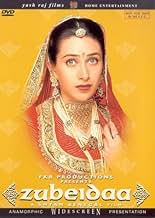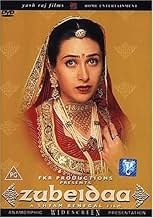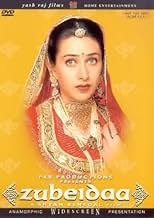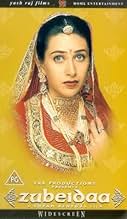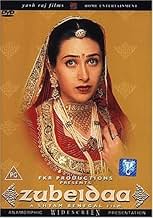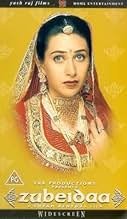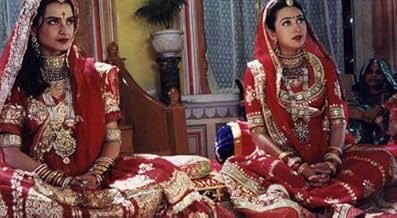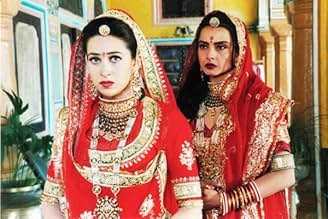IMDb-BEWERTUNG
6,6/10
1793
IHRE BEWERTUNG
Füge eine Handlung in deiner Sprache hinzuZubeidaa, an aspiring Muslim actress, marries a Sikh prince to become his second wife. Her tumultuous relationship with her husband, and her inner demons lead her to a decision which has fat... Alles lesenZubeidaa, an aspiring Muslim actress, marries a Sikh prince to become his second wife. Her tumultuous relationship with her husband, and her inner demons lead her to a decision which has fatal consequences for them all.Zubeidaa, an aspiring Muslim actress, marries a Sikh prince to become his second wife. Her tumultuous relationship with her husband, and her inner demons lead her to a decision which has fatal consequences for them all.
- Regie
- Drehbuch
- Hauptbesetzung
- Auszeichnungen
- 3 Gewinne & 15 Nominierungen insgesamt
Manoj Bajpayee
- Raja Vijendra Singh
- (as Manoj Bajpai)
Rajit Kapoor
- Riyaz Masud
- (as Rajit Kapur)
Empfohlene Bewertungen
A vision of female follies & desires SHYAM Benegal spearheaded the parallel cinema movement in the 70s and the 80s with movies like Nishant and Manthan whereby making icons of Shabana Azmi, Naseeruddin Shah and Smita Patil. His genuine concern with womens' issues is evident in movies like Mammo and Sardari Begum (both scripted by Khalid Mohammad) with their women-oriented themes. His latest film Zubeidaa offers perspective vignettes and explores the female psyche and interaction in different environments. Benegal has a kindly vision of female follies and characters, their motivations, desperation's and desires.
Starring Karisma Kapur, Rekha and Manoj Bajpai, the film has strong a backup in Surekha Sikri and Lillette Dubey, supported by his favorites Amrish Puri and Rajit Kapur, Shyam Benegal calls his film a "lyrical romance" and it is one, but that is not all that his film offers. The film, a period romance set in the 1950s, is the story of a young Muslim girl from an affluent family. When her father discovers that his daughter has signed a film, he forces her into a marriage which ends in a divorce and a baby. Zubeidaa meets her true love, a Rajasthani prince (Manoj Bajpai) but the trouble is that he is already married. However, she consents to becoming his Chhoti Rani.
Basically there are four strongly etched characters in the film. Surekha Sikri is the Muslim wife in an urban, educated setting who abides by the laws set down by the husband and accepts his tyranny as a traditional male domain, "you know sahib always has his way. You'll have to do what he says in the end". Her contemporary is Lillette Dubey who plays Miss Rose Davenport, a dancer in the movies and she's utterly irrepressible! Out to have a good time, she interacts on a superficial level with everyone connected to her. Still she has a kind heart and when she decides that Zubeidaa has had enough of moping around after her divorce, she promptly introduces her to the dashing prince and shamelessly abets the romance. Her statement, "men and horses are more my style my dear", (said with a mischievous wink) is completely her! The interesting thing is that the same fact, when examined by her and by Sikri, portrays diametrically different views of the truth making one realize that truth is never absolute! These two utterly different women, belonging to the same generation, remain true to type till their old age.
Karisma Kapoor and Rekha in Zubeidaa Benegal is never judgmental and nor does he allow the audience to become holier-than-thou. So human are both the women and so sympathetically has the director dealt with his characters that one simply accepts them and likes them.
The main character, that of Zubeidaa, superbly portrayed by Karisma Kapur, has overlapping shades to it. Zubeidaa has fiery feminist instincts and is rebellious and tempestuous until the end. At the same time she's feminine, vulnerable and very young. She chooses to live her life the way she wants to. After giving into paternal authority once in her first marriage, she isn't willing to throw away her chance for happiness the second time. Fully aware of the prince's previous marriage and family, she's ready to accept a strange environment and a different religion for the sake of love. She makes her choices and sacrifices willingly and knowingly. Karisma has surpassed herself as the passionate, defiant, willful and troubled Zubeidaa, the truly modern woman.
In direct contrast to her is Mandira Devi, the Patrani of the prince. Graceful, mature and traditional, she upholds the role and duties of the Rajasthani princess, yet surprises Zubeidaa by saying, "call me Mandy". She treats Zubeidaa with resigned, amused affection, never losing her savor-fare while she instructs Zubeidaa in her expected role.
The most important facet that Benegal has been able to bring out through the film is the fact of female bonding. Whether it is Lillette with Karisma or Karisma with Surekha or Karisma with Rekha, females in the film interact, react, exist and equate with each other, despite the parameters set by males. They understand and accept each others' drives and emotions. Rekha and Karisma, in fact, have a frank discussion about their respective relationships with the prince. Both accept that they have a different role to play in his lifebut in the final analysis, that role is assigned by the male. So if the prince says of his senior wife, "woh eek ache Rajput bah ha", he says to Karisma, "sada ha seen bane Rana Ur Dill belling", leaving no ambiguity in the respective role expectation.
The plot of the story moves fast from scene to scenefrom the 50s to the 80s (the film is in a series of flash-backs) without losing track of the story. It is also not so 'period' that one cannot relate to it. There are traces of the British upper class manners,egg. The meals and decor in Karisma's house is very Anglicized, people speak English comfortably, on the stereo a Dean Martin song is playing, in a party is a live band with the saxophone, trumpet and drums playing a waltz. There are puff sleeves, shingled hair and net depots, there is talk of the newly-formed Pakistan, the Privy-purses being withdrawn is a burning issue and many details like these to make the setting completely authentic. Back home in Fatehpur too, the true Rajasthani setting has been portrayed with attention to minute detail.
In the final analysis, Benegal has made a film which is a milestone as far as women-oriented movies are concerned. The theme, characterization and issues that the film examines are fair to women and have been examined without any searing criticism to mar the tone of the picture.
Starring Karisma Kapur, Rekha and Manoj Bajpai, the film has strong a backup in Surekha Sikri and Lillette Dubey, supported by his favorites Amrish Puri and Rajit Kapur, Shyam Benegal calls his film a "lyrical romance" and it is one, but that is not all that his film offers. The film, a period romance set in the 1950s, is the story of a young Muslim girl from an affluent family. When her father discovers that his daughter has signed a film, he forces her into a marriage which ends in a divorce and a baby. Zubeidaa meets her true love, a Rajasthani prince (Manoj Bajpai) but the trouble is that he is already married. However, she consents to becoming his Chhoti Rani.
Basically there are four strongly etched characters in the film. Surekha Sikri is the Muslim wife in an urban, educated setting who abides by the laws set down by the husband and accepts his tyranny as a traditional male domain, "you know sahib always has his way. You'll have to do what he says in the end". Her contemporary is Lillette Dubey who plays Miss Rose Davenport, a dancer in the movies and she's utterly irrepressible! Out to have a good time, she interacts on a superficial level with everyone connected to her. Still she has a kind heart and when she decides that Zubeidaa has had enough of moping around after her divorce, she promptly introduces her to the dashing prince and shamelessly abets the romance. Her statement, "men and horses are more my style my dear", (said with a mischievous wink) is completely her! The interesting thing is that the same fact, when examined by her and by Sikri, portrays diametrically different views of the truth making one realize that truth is never absolute! These two utterly different women, belonging to the same generation, remain true to type till their old age.
Karisma Kapoor and Rekha in Zubeidaa Benegal is never judgmental and nor does he allow the audience to become holier-than-thou. So human are both the women and so sympathetically has the director dealt with his characters that one simply accepts them and likes them.
The main character, that of Zubeidaa, superbly portrayed by Karisma Kapur, has overlapping shades to it. Zubeidaa has fiery feminist instincts and is rebellious and tempestuous until the end. At the same time she's feminine, vulnerable and very young. She chooses to live her life the way she wants to. After giving into paternal authority once in her first marriage, she isn't willing to throw away her chance for happiness the second time. Fully aware of the prince's previous marriage and family, she's ready to accept a strange environment and a different religion for the sake of love. She makes her choices and sacrifices willingly and knowingly. Karisma has surpassed herself as the passionate, defiant, willful and troubled Zubeidaa, the truly modern woman.
In direct contrast to her is Mandira Devi, the Patrani of the prince. Graceful, mature and traditional, she upholds the role and duties of the Rajasthani princess, yet surprises Zubeidaa by saying, "call me Mandy". She treats Zubeidaa with resigned, amused affection, never losing her savor-fare while she instructs Zubeidaa in her expected role.
The most important facet that Benegal has been able to bring out through the film is the fact of female bonding. Whether it is Lillette with Karisma or Karisma with Surekha or Karisma with Rekha, females in the film interact, react, exist and equate with each other, despite the parameters set by males. They understand and accept each others' drives and emotions. Rekha and Karisma, in fact, have a frank discussion about their respective relationships with the prince. Both accept that they have a different role to play in his lifebut in the final analysis, that role is assigned by the male. So if the prince says of his senior wife, "woh eek ache Rajput bah ha", he says to Karisma, "sada ha seen bane Rana Ur Dill belling", leaving no ambiguity in the respective role expectation.
The plot of the story moves fast from scene to scenefrom the 50s to the 80s (the film is in a series of flash-backs) without losing track of the story. It is also not so 'period' that one cannot relate to it. There are traces of the British upper class manners,egg. The meals and decor in Karisma's house is very Anglicized, people speak English comfortably, on the stereo a Dean Martin song is playing, in a party is a live band with the saxophone, trumpet and drums playing a waltz. There are puff sleeves, shingled hair and net depots, there is talk of the newly-formed Pakistan, the Privy-purses being withdrawn is a burning issue and many details like these to make the setting completely authentic. Back home in Fatehpur too, the true Rajasthani setting has been portrayed with attention to minute detail.
In the final analysis, Benegal has made a film which is a milestone as far as women-oriented movies are concerned. The theme, characterization and issues that the film examines are fair to women and have been examined without any searing criticism to mar the tone of the picture.
10suhailmu
This is by far one of the best Indian movies I have ever seen. One really gets a sense of the life in the early 1950's in India. The plot is very rich. Full of life. Full of characters, nuances. There are so many stories in the background: partition, status of Muslims in India, Indian cenima, fate of Indian principalties. The dialogue is just awesome. But, of course, the focus and center of the movie is the story of Zubedaa. Khaled Mohammed's script -- based on the life of is mother -- is simply amazing. In general, I do not like Karishma Kapoor's movies -- but she gives a phenomenol performance here, even better than her performance in Fiza. I hope she will continue do serious roles in the future. In fact, everyone in the movie is great. There are no "mistakes" in the movie. What starts out as very simple story builds up to something very powerful. There is no naive sentimentality here. This is art! High art! And no this is not one of those aesthetic pieces that are out of touch with reality. I just cannot say enough about the movie. Perfect, perfect, perfect.
Of course, this movie is only for serious viewers. If you are looking for action or laughs, look else where.
Of course, this movie is only for serious viewers. If you are looking for action or laughs, look else where.
Shyam Benegal continues to carve out a niche as one of the leaders & promoters of indian parallel cinema. this film is based on a true story, set in last days of British rule in India. the acting is good all around, although no fireworks here. Karisma is as good here as she was in FIZA. it is a fairly straight forward biography, and although it was nicely done, i found it rather luke-warm as compared to Benegal's other films. in any case, it is a much needed break for viewers who are tired of watching typical Indian masala potboilers.
Zubeida, is a classic film. In fact one of the best films to come out of the Hindi Film industry in recent times. All the aspects of the film, whether be it the taut and intelligent Direction (vintage Benegal ji), the music (the re-incarnation of R.D.Burman as modern age A.R. Rehman giving very popular and ever lasting amazing numbers, the haunting lyrics, the very original storyline, the entire canvass, was a cinematic treat. Of course the histrionic talents of Surekha Sikri, Amrish Puri, MAnoj Bajpai, Rajat Kapoor, Lillette Dubey amongst others combined with the deadly combination duo of my all time favourite actresses REkha and KArisma KApoor was deadly! In fact i can't thank Mr. Benegal enough for bringing these two great actresses in the same canvas and the result was there for everyone to see. KArisma, i would say, excelled is a low word, she just was as good as Smita Patil or Shabana Azmi would have been in the same role. The kind of Depth, the look, the innocence, the beauty, the charisma, the fear, the strength, the naivety, the revolt, the love - all these expressions and more that she displayed in this film were worth a NAtional Award at least if not the Oscar! Well, the Filmfare critics award made up for it. All in all a collector's item, a great always-to-be-remembered film.
9sai
I saw this movie with minimal expectations. Except that Shyam Benegal is known to make 'art' movies.
I left with a most wonderful feeling. Shyam Benegal has bridged the gap between serious movies and the pot boilers produced by Bollywood. I don't expect this movie to be a hit. But here are the things I found fascination in the movie (in no particular order):
i) The character of Zubeida as played by Karisma Kapoor was perfect! If it was the intention of the director to show her as a very happy-go-lucky girl that does not want to be confined by anyone or anything - she has portrayed it superbly. Of course, she DOES come across as being selfish, as not being willing to share the limelight (or her love for that matter) with another. But - that is what she IS!
ii) The story was very melancholic. Interspersed with moments of laughter. But the melancholy prevails thru till the last frame.
iii) Cinematography has a dream like quality (when in flashback mode) along with a matter of fact presence today. I especially liked the sepia tones of yester year juxtaposed with the more real life tones of the present day.
iv) The direction itself is (as usual) flawless. I thought there was a mistake once or twice - but upon rewinding I saw (to my relief) that I was very much mistaken. The only part not so convincing is the plane crash itself. If only Indian movie makers would not mind doing the real thing :-) In particular, I feel the reason Karisma seems to be so perfect in this role, is the director. That is NOT to detract from her performancs! But just having Shyam Benegal as a director raises you to the next level - that you probably never knew existed.
v) The camera work is poetic. Whether in the past or in the present, it seems to caress each of the central characters. Whether it is Amrish Puri or Rose in the past or Rajit Kapur and the palace in the present, the camera seems to linger longingly on each of them. Especially in the present, when the camera seems to wish the place back to life the way it was.
vi) Manoj Bajpai's casting (Victor). This, as expected, is one of the most controversial castings ever done. Manoj's portrayals in movies so far have been anything BUT regal. However, it is MY feeling that he did a commendable job of airing royalty. I thought he was cast perfectly. However, his younger brother seems to be more regal than him. In the one scene in the present, he does look like a former maharaja.
vii) Rekha as the Queen (Mandira Devi). Now THIS was a big no-no in my view. She looked so much older than him! However, if history has to be portrayed correctly, what other choice do we have?
viii) Lilette Dubey (Rose). This is ONE woman you can see as having done her role complete justice. She floats thru it and you are left wondering whether you should be loving her or hating her.
ix) Karisma Kapoor (Zubeidaa). I don't mean to belittle her by talking about her so late in the review. She was perfect for the role. She has done the role perfectly. You love to love the vivacious girl in her. You struggle along with her as she tries to adjust to being a queen - failing miserably. You want to dance with her - when she commits the crime of dancing along with the visiting commoners. You fall in love along with her. She deserves to win the Filmfare award for best actress for 2001. She has proved that she is not a mere bimbette (as Dimple has ably demonstrated the transition from bikini clad gal to fine actress) and is probably the only one of the current Kapoor generation worthy of her great grandfather's name.
I rate this movie a 9 out of 10.
I left with a most wonderful feeling. Shyam Benegal has bridged the gap between serious movies and the pot boilers produced by Bollywood. I don't expect this movie to be a hit. But here are the things I found fascination in the movie (in no particular order):
i) The character of Zubeida as played by Karisma Kapoor was perfect! If it was the intention of the director to show her as a very happy-go-lucky girl that does not want to be confined by anyone or anything - she has portrayed it superbly. Of course, she DOES come across as being selfish, as not being willing to share the limelight (or her love for that matter) with another. But - that is what she IS!
ii) The story was very melancholic. Interspersed with moments of laughter. But the melancholy prevails thru till the last frame.
iii) Cinematography has a dream like quality (when in flashback mode) along with a matter of fact presence today. I especially liked the sepia tones of yester year juxtaposed with the more real life tones of the present day.
iv) The direction itself is (as usual) flawless. I thought there was a mistake once or twice - but upon rewinding I saw (to my relief) that I was very much mistaken. The only part not so convincing is the plane crash itself. If only Indian movie makers would not mind doing the real thing :-) In particular, I feel the reason Karisma seems to be so perfect in this role, is the director. That is NOT to detract from her performancs! But just having Shyam Benegal as a director raises you to the next level - that you probably never knew existed.
v) The camera work is poetic. Whether in the past or in the present, it seems to caress each of the central characters. Whether it is Amrish Puri or Rose in the past or Rajit Kapur and the palace in the present, the camera seems to linger longingly on each of them. Especially in the present, when the camera seems to wish the place back to life the way it was.
vi) Manoj Bajpai's casting (Victor). This, as expected, is one of the most controversial castings ever done. Manoj's portrayals in movies so far have been anything BUT regal. However, it is MY feeling that he did a commendable job of airing royalty. I thought he was cast perfectly. However, his younger brother seems to be more regal than him. In the one scene in the present, he does look like a former maharaja.
vii) Rekha as the Queen (Mandira Devi). Now THIS was a big no-no in my view. She looked so much older than him! However, if history has to be portrayed correctly, what other choice do we have?
viii) Lilette Dubey (Rose). This is ONE woman you can see as having done her role complete justice. She floats thru it and you are left wondering whether you should be loving her or hating her.
ix) Karisma Kapoor (Zubeidaa). I don't mean to belittle her by talking about her so late in the review. She was perfect for the role. She has done the role perfectly. You love to love the vivacious girl in her. You struggle along with her as she tries to adjust to being a queen - failing miserably. You want to dance with her - when she commits the crime of dancing along with the visiting commoners. You fall in love along with her. She deserves to win the Filmfare award for best actress for 2001. She has proved that she is not a mere bimbette (as Dimple has ably demonstrated the transition from bikini clad gal to fine actress) and is probably the only one of the current Kapoor generation worthy of her great grandfather's name.
I rate this movie a 9 out of 10.
Wusstest du schon
- WissenswertesThe jewelry worn by Karisma Kapoor and Rekha in the film actually belonged to the Jaipur royal family. Both actresses were told to be very careful when wearing it.
- PatzerThe events of the movie are happening in the 1950s, around the time of decolonization, yet the prince Victor appears to be flying a 1982 model of Cessna 172.
- VerbindungenFeatured in Bollywood/Hollywood (2002)
Top-Auswahl
Melde dich zum Bewerten an und greife auf die Watchlist für personalisierte Empfehlungen zu.
- How long is Zubeidaa?Powered by Alexa
Details
- Laufzeit2 Stunden 33 Minuten
- Farbe
- Sound-Mix
- Seitenverhältnis
- 2.35 : 1
Zu dieser Seite beitragen
Bearbeitung vorschlagen oder fehlenden Inhalt hinzufügen


